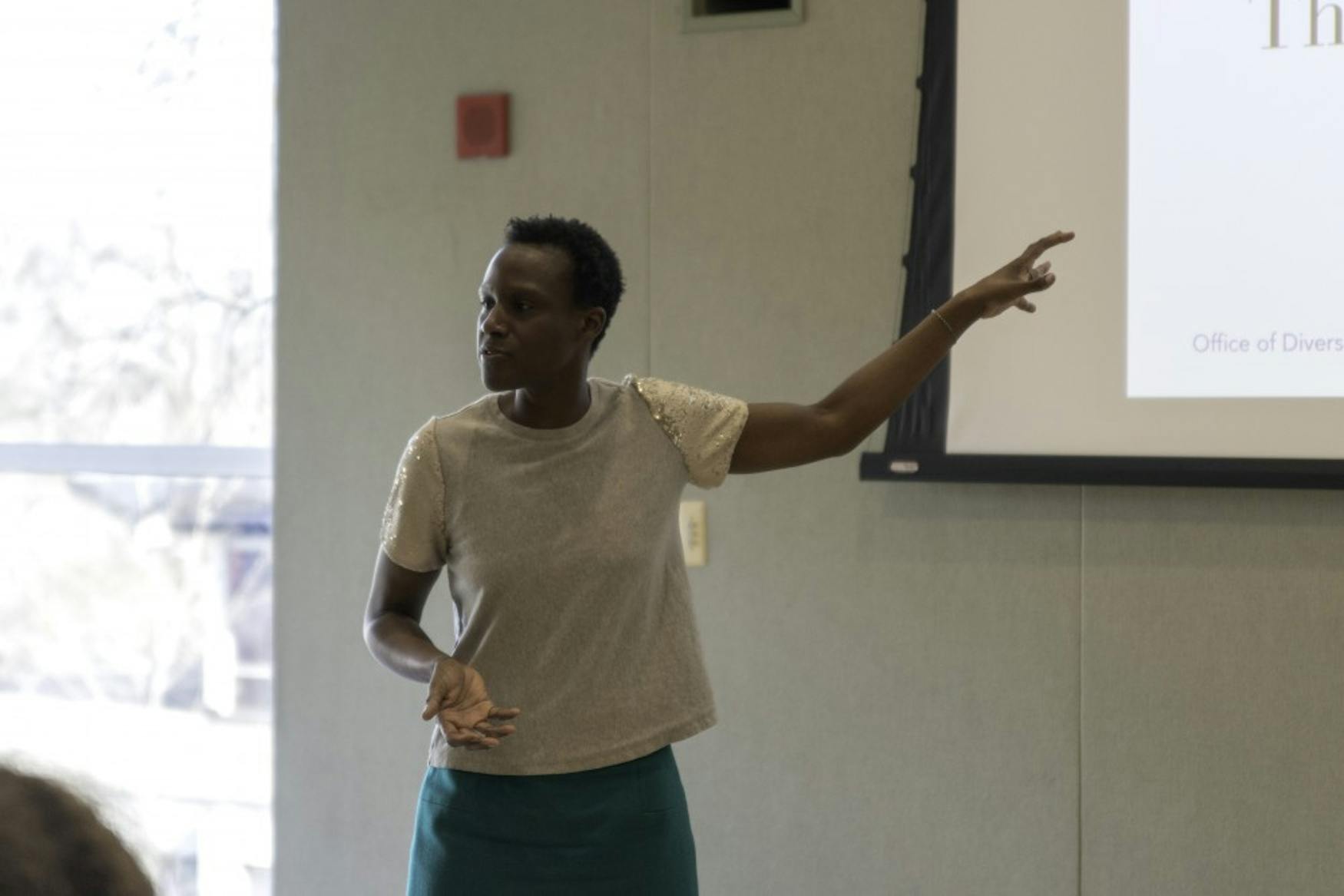Students and faculty discuss privilege, campus race relations
This event was co-hosted by PARC and ODEI. The leader of the training addressed privilege, oppression and more.
Students convened in the SCC Multipurpose Room on March 27 for the semesterly Racial Justice Bystander Interventions, co-sponsored by the Prevention Advocacy and Resource Center and the Office of Diversity, Equity and Inclusion. Dr. Allyson Livingstone, the director of Diversity, Equity and Inclusion Education Training and Development, led the training.
Livingstone started the presentation by sharing how she has been “support[ing] conceptual knowledge specifically [centered] around intersectional racial justice,” referencing her extensive experience in social justice education training. Individuals’ identities are integral to shaping “the way we experience race and racism,” Livingstone said. She centered the discussion around the effects of racism on one’s understanding of privilege and oppression, which is expressed “internally, interpersonally, institutionally and instructionally” based on individuals’ social identity groups, according to Livingstone.
Born and raised in Brookline, Massachusetts, a predominantly white community, Livingstone found it challenging to understand her identity as a Black woman without much relevant conversation about race occurring in her community. She emphasized that her perspective is “rooted” in her “personhood” and may “not resonate with” those from different backgrounds. However, she encouraged students to engage in conversations with “empathy,” to reflect on their own beliefs about racism and to listen to others’ perspectives, even without necessarily agreeing with them. Stressing the importance of mutual understanding, she clarified the difference between “sympathy and empathy.” While both seek understanding of others’ emotions and beliefs, empathy means to express willingness to consider others’ perspectives from “a position of curiosity” and to comprehend these perspectives “without assuming you ever fully understand,” Livingstone explained.
Reaching a mutual understanding requires more than transcending interpersonal differences to consider outside viewpoints, Livingstone said. She explained that mutual understanding also involves being informed about the “process by which [individuals] become accustomed to societal norms.”
Explaining the practice of socialization, Livingstone discussed how the way individuals view themselves in the world may have some messages that implicitly “reveal privilege and oppression” and solidify the internalization of implicit bias. In particular, Livingstone pointed out that racism and capitalism work “hand in hand” and are connected not only to wealth acquisition, but also to the history that contributes to the emergence of racism. Since individuals have been categorized by racial identities throughout history, privilege makes some people feel “entitled without thinking of what others may be experiencing,” Livingstone explained.
Continuing her discussion of implicit biases in privilege and oppression, Livingstone described how many factors created the current institutional culture. As privilege and oppression are internalized in individuals, they will be reflected in interpersonal relationships that make people believe one person is superior to another. Thus, this false sense of superiority impacts the way that institutions structure their policies and practices. Livingstone said that this ongoing cycle is illustrated in the faculty search committee in the Dean of Students Office, for which she has been working to provide educational and training strategies. Among full-time professors, only one percent identify as Black or African-American compared to five percent of professors nationwide, a trend that has persisted for many years. Thus, Livingstone highlighted the importance of accounting for the effect of implicit biases in every step of the process, offering insights on her future work.
Regarding the continuation of the impact of privilege and oppression, Livingstone stressed the importance of students becoming “prosocial bystander[s]” in negative situations and mitigating the conflict in a manner that “ensure[s] the safety of all [individuals] involved.” She also emphasized that such individuals value “accountability and prioritize long-term support and safety” by acting rationally in accordance with the environment. Additionally, Livingstone addressed ongoing institutional endeavors to counter the implications of privilege and racism. She has been collaborating with Sarah Berg, the director of PARC, to coordinate prosocial bystander trainings in order to equip students with effective intervention techniques.
Under the current structure of socialization, individuals suffer from “lack of exposure to multiple identities,” Livingstone said. Thus, she urged students to be courageous and to bring forth discussions even when the truth “hurts.” In response to misunderstandings about racial justice, Livingstone said, upfront communication will not deteriorate relationships, but will strengthen them as individuals “create spaces” to open up to one another. In closing, Livingstone provided resources for students to address the issues of racial and gender discrimination. In the meantime, she demonstrated her willingness to engage in further conversations with interested students and serve as a resource for subjects pertinent to diversity and inclusion.



Please note All comments are eligible for publication in The Justice.